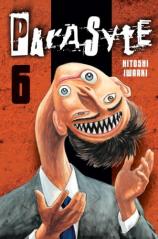Parasyte 6
Review
Parasyte 6
No doubt about it: It’s easy to dismiss much of the horror manga out there. Often combining clichéd elements of both genres (placing handsome young people in peril while orchestrating elaborate high-school melodramatics), these manga serve up lurid cocktails that can recall the worst underground horror comix of years past.
The funny thing about Hitoshi Iwaaki’s ’90s series Parasyte, though, is that from these same ingredients it somehow produces a highly original work that’s so thoughtful that “philosophical” might be a better way to describe it. Not to imply that there’s any shortage of the visceral to go along with the cerebral, but even the bloody set pieces punctuating the story are oddly closer in tone to a science experiment than a slasher film.
Although more than a year into its Del Rey run, Parasyte shows no sign of running out of gas as it artfully spins out a complex and increasingly high stakes tale from the most simple of premises. The parasites of the title are intelligent life forms of mysterious origin. Frail enough that they cannot live outside a host body, they are nonetheless powerful enough to transform that body into a fluid weapon when needed (think a more organic version of Robert Patrick in T2). Unfortunately, that “when needed” is the kicker—the parasites’ diet consists chiefly of human beings.
Happily, our protagonist, secondary student Shinichi Izumi, doesn’t have to worry about cannibalism with the parasite that’s made its home inside him: It controls only his right arm, not his entire brain and body, and he often converses with it as if in a demonic parody of Señor Wences. Indeed, Iwaaki does a wonderful job of exploring the thematic possibilities of this “divided self” metaphor as the selfish, survival-oriented parasite Migi must coexist with the compassionate and sensitive Shinichi. Here’s an example of their dialogue that illustrates both the series’ stark science-fiction preoccupations and its mordant humor:
Migi: “I’m not human, so human laws and morality don’t apply.”
Shinichi: “But you’re my hand!”
To be sure, not all of their interactions are so goofy. Due to the somewhat porous nature of the boundaries between them, Shinichi becomes less recognizable, at least psychologically, to his peers. In one memorable scene, he catches his love interest off-guard when he coldly (but logically) comments to her, as Migi might, “A dead dog is no longer a dog. It is meat in the shape of a dog.”
More than their acts of violence or uncanny nature, it’s the parasites’ outlook that’s so chilling. And while the story’s characters can’t distinguish them from humans, Iwaaki draws them with an understated deadness in their eyes that instantly alerts readers.
That same mastery of minimalism is as just evident in the plotting. With no filler or self-indulgent tangents to bloat the storyline (always a risk with certain genres of manga), the narrative moves briskly yet never feels lightweight. Even more remarkable is the impression it gives of being both structured and improvised.
For all these reasons, and more, Parasyte well deserves to be considered a classic of its type—and to be read by those who might typically shy away from science fiction or horror.
Reviewed by Peter Gutiérrez on July 12, 2012
Parasyte 6
- Publication Date: January 27, 2009
- Genres: Graphic Novel, Manga
- Paperback: 288 pages
- Publisher: Del Rey
- ISBN-10: 0345500342
- ISBN-13: 9780345500342



